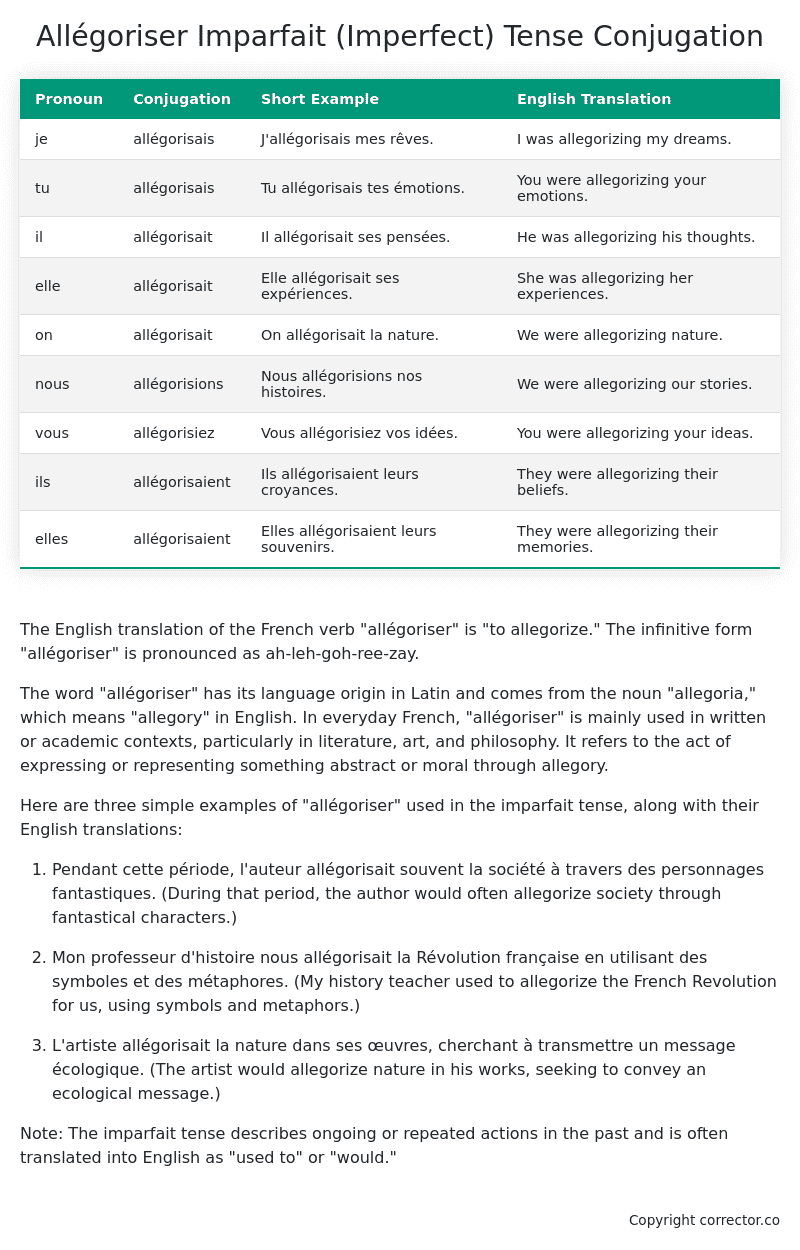Imparfait (Imperfect) Tense Conjugation of the French Verb allégoriser
Introduction to the verb allégoriser
The English translation of the French verb “allégoriser” is “to allegorize.” The infinitive form “allégoriser” is pronounced as ah-leh-goh-ree-zay.
The word “allégoriser” has its language origin in Latin and comes from the noun “allegoria,” which means “allegory” in English. In everyday French, “allégoriser” is mainly used in written or academic contexts, particularly in literature, art, and philosophy. It refers to the act of expressing or representing something abstract or moral through allegory.
Here are three simple examples of “allégoriser” used in the imparfait tense, along with their English translations:
-
Pendant cette période, l’auteur allégorisait souvent la société à travers des personnages fantastiques. (During that period, the author would often allegorize society through fantastical characters.)
-
Mon professeur d’histoire nous allégorisait la Révolution française en utilisant des symboles et des métaphores. (My history teacher used to allegorize the French Revolution for us, using symbols and metaphors.)
-
L’artiste allégorisait la nature dans ses œuvres, cherchant à transmettre un message écologique. (The artist would allegorize nature in his works, seeking to convey an ecological message.)
Note: The imparfait tense describes ongoing or repeated actions in the past and is often translated into English as “used to” or “would.”
Table of the Imparfait (Imperfect) Tense Conjugation of allégoriser
| Pronoun | Conjugation | Short Example | English Translation |
|---|---|---|---|
| je | allégorisais | J’allégorisais mes rêves. | I was allegorizing my dreams. |
| tu | allégorisais | Tu allégorisais tes émotions. | You were allegorizing your emotions. |
| il | allégorisait | Il allégorisait ses pensées. | He was allegorizing his thoughts. |
| elle | allégorisait | Elle allégorisait ses expériences. | She was allegorizing her experiences. |
| on | allégorisait | On allégorisait la nature. | We were allegorizing nature. |
| nous | allégorisions | Nous allégorisions nos histoires. | We were allegorizing our stories. |
| vous | allégorisiez | Vous allégorisiez vos idées. | You were allegorizing your ideas. |
| ils | allégorisaient | Ils allégorisaient leurs croyances. | They were allegorizing their beliefs. |
| elles | allégorisaient | Elles allégorisaient leurs souvenirs. | They were allegorizing their memories. |
Other Conjugations for Allégoriser.
Le Present (Present Tense) Conjugation of the French Verb allégoriser
Imparfait (Imperfect) Tense Conjugation of the French Verb allégoriser (You’re reading it right now!)
Passé Simple (Simple Past) Tense Conjugation of the French Verb allégoriser
Passé Composé (Present Perfect) Tense Conjugation of the French Verb allégoriser
Futur Simple (Simple Future) Tense Conjugation of the French Verb allégoriser
Futur Proche (Near Future) Tense Conjugation of the French Verb allégoriser
Plus-que-parfait (Pluperfect) Tense Conjugation of the French Verb allégoriser
Passé Antérieur (Past Anterior) Tense Conjugation of the French Verb allégoriser
Futur Antérieur (Future Anterior) Tense Conjugation of the French Verb allégoriser
Subjonctif Présent (Subjunctive Present) Tense Conjugation of the French Verb allégoriser
Subjonctif Passé (Subjunctive Past) Tense Conjugation of the French Verb allégoriser
Subjonctif Imparfait (Subjunctive Imperfect) Tense Conjugation of the French Verb allégoriser
Conditionnel Présent (Conditional Present) Tense Conjugation of the French Verb allégoriser
Conditionnel Passé (Conditional Past) Tense Conjugation of the French Verb allégoriser
Conditionnel Passé II (Conditional Past II) Tense Conjugation of the French Verb allégoriser
L’impératif Présent (Imperative Present) Tense Conjugation of the French Verb allégoriser
L’impératif Passé (Imperative Past) Tense Conjugation of the French Verb allégoriser
L’infinitif Présent (Infinitive Present) Tense Conjugation of the French Verb allégoriser
L’infinitif Passé (Infinitive Past) Tense Conjugation of the French Verb allégoriser
Le Participe Présent (Present Participle) Tense Conjugation of the French Verb allégoriser
Le Participe Passé (Past Participle) Tense Conjugation of the French Verb allégoriser
Struggling with French verbs or the language in general? Why not use our free French Grammar Checker – no registration required!
Get a FREE Download Study Sheet of this Conjugation 🔥
Simply right click the image below, click “save image” and get your free reference for the allégoriser imparfait tense conjugation!

Allégoriser – About the French Imparfait Tense
NOTE: To take a deep dive into all the French tenses then see our article on Mastering French Tense Conjugation.
Formation of the Imparfait Tense
For regular -er verbs:
For regular -ir verbs
For regular -re verbs
Common Everyday Usage Patterns
Description of Past Habits
Background Information
Mental and Emotional States
It’s employed to express emotions, thoughts, or physical sensations in the past. For example: “J’étais content quand il est arrivé.” (I was happy when he arrived.)
Ongoing Actions
Points to Note About the Imparfait Tense
Passé Composé vs. Imparfait
Conditional
Si Clauses
Narration
I hope you enjoyed this article on the verb allégoriser. Still in a learning mood? Check out another TOTALLY random French verb imparfait conjugation!


